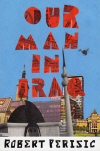Our Man in Iraq
What can a novel show us that a textbook might not? Perhaps it can demonstrate how people truly live and breathe in any historical point in time. When I was young, novels like Robert Olen Butler’s Alleys of Eden presented an experience of what the American debacle in Vietnam was like. Richard Wright’s Black Boy revealed a world so alien to me, a Midwestern white boy, that I could hardly believe it was real. The Orphan Master’s Son took me to North Korea. Of course I studied history books in school and on my own, but it was the novels that left an imprint as if they were true memories. They took me to real places.
What can a novel show us that a textbook might not? Perhaps it can demonstrate how people truly live and breathe in any historical point in time. When I was young, novels like Robert Olen Butler’s Alleys of Eden presented an experience of what the American debacle in Vietnam was like. Richard Wright’s Black Boy revealed a world so alien to me, a Midwestern white boy, that I could hardly believe it was real. The Orphan Master’s Son took me to North Korea. Of course I studied history books in school and on my own, but it was the novels that left an imprint as if they were true memories. They took me to real places.
Robert Perisic’s novel Our Man in Iraq takes us to a modern-day Croatia with growing pains as it struggles to catch the bus of global capitalism while jumping from the cab of European socialism. Toni, the book’s hero and drama student-turned-economic reporter, explains:
We’ve been through communism, war and dictatorship. Constant brain-ironing. Your circumstances adjust miraculously when you live in systems like that and you don’t have the dough for big experiments. Your life shrink-wraps around you and you tread a narrow path; you hold course and wait for the storm to blow over.
Perisic’s story opens in Zagreb, a metropolitan center in Croatia, with our aforementioned hero and journalist struggling to build a life for himself and his girlfriend Sanja, whose star is rapidly rising in the theater world. “We belonged elsewhere, somewhere better—we were artists, after all! No one understood us,” he laments. Alas, Toni finds himself instead pressured by a well-meaning but pushy family to hire his cousin Boris to work for Toni’s paper. Boris is one of those hard to employ relatives who depend on the kindness of others to get by. Toni decides to send Boris to Iraq to cover the war. Cousin Boris promptly begins sending back email dispatches which are part Gonzo, bordering on incoherent, yet strangely convey a reality more accurately than traditional approaches. “When the price of Tomahawks comes down the world will change. When they come up with advanced weaponry at an acceptable price, the world will be different. Then the Yanks will also be able to intervene where there’s no money. But the question is when that’s going to happen,” Boris ponders in one note. Toni takes the heat, though, when Boris goes missing. Then it is discovered that he was Toni’s cousin. The dung hits the fan and Toni is fired for nepotism, just as his girlfriend’s acting star continues to grow. “My whole life I’d secretly been waiting for a miracle,” confesses Toni, “And now it was high time for it to happen.” Toni’s miracle doesn’t occur; instead he invests his entire savings in a bank which promptly fails.
But not to fear, it’s always darkest before the sun comes up, and Perisic takes you on a literary roller-coaster ride across a country that is as turbulent as the lives it is hosting. Along the way you will meet a cast of characters who pop off the page, including Toni’s friend, Markatovic, who “had a registered firm for marketing, publishing, and all sorts of things, and he drank too much coffee all over town; he handled a million pieces of information from all sorts of different departments. He liked to say he knew half the country, and he presented himself as a link to everything.” There is the bodyguard-surrounded tycoon, Dolina, “a dissident who’d clashed with the powers-that-be in the capital,” and the old economist, Mr. Olenic, “who’d witnessed all the reforms of the last decades” and whom Toni interviews for his paper, delivering his overview of the present-day Croation economic picture. Then add a cast of eccentric family members and girlfriends. You wouldn’t find most of these characters in a textbook, just as you might be hard-pressed to find Joseph Heller’s Yossarian in a history of WWII.
Our Man in Iraq was published in Croatia in 2008 and enjoyed eight weeks on the bestseller list. Here’s hoping the American public gives Perisic an equal look.





